Application to count vowels and consonants letters in a sentence.
This is another solution with less lines of code with understanding the idea of using loops and nested loops with char arrays.
An application interface with control names:

namespace Program8_4
{
public partial class Form1 : Form
{
// declare the counter variables in field
int iNumberOfVowels = 0;
int iNumberOfConsonants = 0;
public Form1()
{
InitializeComponent();
}
private void btnFind_Click(object sender, EventArgs e)
{
// call the methods in this event
GetVowels(txtStringInput.Text);
GetConsonants(txtStringInput.Text);
// show the result in a label
lblOutput.Text = "The number of vowels : " + iNumberOfVowels.ToString()+ Environment.NewLine+
"The number of consonants : " + iNumberOfConsonants.ToString();
// assign zero the counters to not add the previous number to new number, and start counting from zero again
iNumberOfVowels = 0;
iNumberOfConsonants = 0;
}
private int GetConsonants(string strFindConsonants)
{
// Declare char array to contain consonants letters
char[] chrConsonants = { 'B', 'C', 'D', 'F', 'G', 'H', 'J', 'K', 'L', 'M', 'N', 'P', 'Q', 'R', 'S', 'T', 'V', 'X',
'b', 'c', 'd', 'f', 'g', 'h', 'j', 'k', 'l', 'm', 'n', 'p', 'q', 'r', 's', 't', 'v', 'x' };
// loop to get each letter from sentence
foreach (char Consonants in strFindConsonants)
{
// another nested loop to compare each letter with all letters contains in chrConsonants array
for (int index= 0; index<chrConsonants.Length;index++)
{
// compare each letter with each element in charConsonants array
if (Consonants == chrConsonants[index])
{
// If it is true add one to the counter iNumberOfConsonants
iNumberOfConsonants++;
}
}
}
// return the value of iNumberOfConsonants
return iNumberOfConsonants;
}
private int GetVowels(string strFindVowels)
{
// Declare char array to contain vowels letters
char[] chrVowels = { 'a', 'e', 'i', 'o', 'u', 'A', 'E', 'I', 'O','U' };
// loop to get each letter from sentence
foreach (char Vowels in strFindVowels)
{
// another nested loop to compare each letter with all letters contains in chrVowels array
for (int index = 0; index< chrVowels.Length; index++)
{
// compare each letter with each element in chrVowels array
if (Vowels == chrVowels[index])
{
// If it is true add one to the counter iNumberOfVowels
iNumberOfVowels = iNumberOfVowels+1;
}
}
}
// return the value of iNumberOfVowels
return iNumberOfVowels;
}
